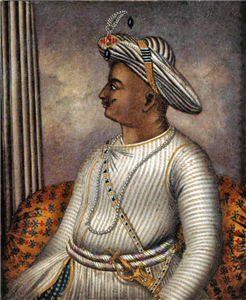Tipu Sultan | view more tourist attractions
Tipu Sultan ( Urdu: , Kannada : ) (20 November 1750 – 4 May 1799), also known as the Tiger of Mysore, Dipu Sultan and Tipu Sahib, was a ruler of the Kingdom of Mysore. He was the eldest son of Sultan Hyder Ali of Mysore. Tipu introduced a number of administrative innovations during his rule, including his coinage, a new Mauludi lunisolar calendar, and a new land revenue system which initiated the growth of Mysore silk industry. Tipu expanded the iron-cased Mysorean rockets and wrote the military manual Fathul Mujahidin, considered a pioneer in the use of rocket artillery. He deployed the rockets against advances of British forces and their allies in their 1792 and 1799 Siege of Srirangapatna.
Napoleon, the French commander-in-chief who later became emperor, sought an alliance with Tipu. In alliance with the French in their struggle with the British, and in Mysore's struggles with other surrounding powers, both Tipu and his father used their French trained army against the Marathas, Sira, and rulers of Malabar, Kodagu, Bednore, Carnatic, and Travancore. During Tipu's childhood, his father rose to take power in Mysore, and upon his father's death in 1782, Tipu succeeded to a large kingdom bordered by the Krishna River in the north, the Eastern Ghats in the east, and the Arabian Sea in the west. He won important victories against the British in the Second Anglo-Mysore War, and negotiated the 1784 Treaty of Mangalore with them after his father Hyder Ali suddenly died from cancer in December 1782 during the Second Anglo-Mysore War.
Tipu engaged in expansionist attacks against his neighbours. He remained an implacable enemy of the British East India Company, bringing them into renewed conflict with his attack on British-allied Travancore in 1789. In the Third Anglo-Mysore War, Tipu was forced into the humiliating Treaty of Seringapatam, losing a number of previously conquered territories, including Malabar and Mangalore. He sent emissaries to foreign states, including the Ottoman Turkey, Afghanistan, and France, in an attempt to rally opposition to the British. In the Fourth Anglo-Mysore War, the combined forces of the British East India Company and the Nizam of Hyderabad defeated Tipu, and he was killed on 4 May 1799 while defending his fort of Srirangapatna. The Karnataka Government has been lately trying to portray Tipu Sultan as a State Hero. He is regarded a hero in Pakistan as well, and the PNS Tippu Sultan ships of the Pakistan Navy are named after him. But outside the old region of Mysore, in some South Indian regions such as Kodagu, Malabar, and Dakshina Kannada, Tipu has been accused of religious bigotry.
